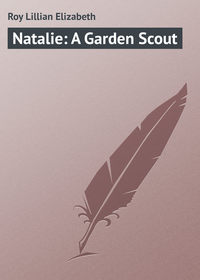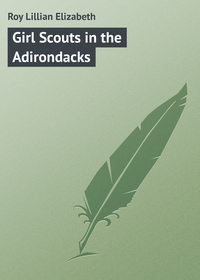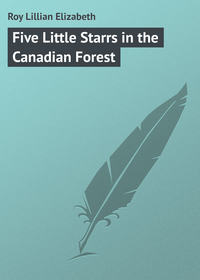 полная версия
полная версияThe Woodcraft Girls at Camp
More than an hour was spent in finding the spot the deer had for a refuge. Then, Zan being the first to lead, gave the signal that the deer was found. They all trailed along the corn scent until they met near the entrance to the cave. Here, against the opening, stood the brave burlap deer, and Zan soon had the satisfaction of chasing Fiji down the hill-side, fleeing from her arrows, which she aimed at him in punishment for doing the very thing he had been told not to do. The doctor picked up the helpless deer and laughingly carried it back to camp.
"I think Fiji is too mean for anything, Miss Miller, because we might have won another honour if he hadn't made a mess of the game!" complained Zan.
But the others laughed heartily, and averred that they enjoyed the hunt just as much as if the deer had been killed.
All too soon came the time to bid the visitors good-bye, and the girls heard with pride their parents commend Miss Miller on the wonderful improvement in them all. The great carryall was waiting at Bill's, so every one ran down the slope, the visitors climbing in, and the campers watching and advising, until Bill flourished his whip and rattled off along the road to Junction.
Gathered about the rock where Council generally was held, the girls reviewed the exciting times of the day.
"Miss Miller, that was the finest party I ever attended," laughed Jane.
"I smelled a rat when I saw that carryall by Bill's door, but I never dreamed that Miss Miller had planned it. I thought perhaps some of our folks were coming down to surprise us, and I was delighted to think it fell on your birthday," said Zan.
Then the Guide told how she first got the idea to surprise them in return for their secrets.
"Well, the doctor seems thoroughly pleased with our experiment, doesn't he?" said Hilda, remembering the wondering looks of all of the parents.
"Indeed he is! He told me, just before leaving, that the remarkable improvement in Zan and Nita far surpassed the others," said Miss Miller.
"Me! Why, I am always all right! What did he mean?" questioned Zan, astonished.
"He missed a most familiar habit, and said that the improvement was to be continued," laughed the Guide.
"Ha, ha! Zan, he meant your slang!" cried Elena.
"Oh, but I haven't quit that yet! I shall some day!" added Zan.
"You have dropped so much of it that it is remarked by those who have not heard you in a month, but to yourself it may not seem such an improvement," explained Miss Miller.
"What was it about me?" queried Nita timidly.
"He said he had never seen you in such fine health. He said that your very hair sparkled with better vitality, and your eyes were a rested blue now, where they used to be so tired. Then, too, he spoke of the improved poise in your general manners," said Miss Miller kindly, patting Nita on the shoulder.
"I'm so glad, but I really did feel badly, Miss Miller, when I found it was impossible for my family to be here with the others. I am sure mother would have been proud to see how well I am, and father would take great pleasure in seeing me do all the things I can do now," said Nita wistfully.
At that admission, the Guide thanked goodness that she had urged the doctor to make an excuse for Nita's parents, and she vowed that never a word of the truth would reach the girl from her. Time, she knew to be a kind healer, so it would not hurt as much should Mrs. Brampton ever mention it. But Miss Miller thought she understood Nita's mother well enough to know that of her own accord she would never touch upon an unpleasant subject.
The Band were so fatigued that immediately after a light supper they sought their cots, and were soon sound asleep.
CHAPTER FOURTEEN
RAINY DAYS AND WOODCRAFT LORE
The Band soon settled down into routine life again after the surprise party, the girls excelling each other in the preparation of simple meals, swimming, and other requirements of a first-rate Woodcrafter. They often referred to the Manual for ideas of how to win coups and honours, their ambition being to be able at the end of the summer to show a long line of decorations for their ceremonial dress.
Nita was working eagerly on an Indian Clock, or sundial for camp. Jane was making a correct map of the country about the camp. Elena was interested in collecting and mounting moths and insects for grand coups. Zan was becoming so expert with rod and tackle that ofttimes she returned to camp, after a few hours' absence, with a fine mess of fish. She was eager to win a coup for this claim, and was becoming a good sportswoman. Hilda, always inclined to household ideas, had won her coup for cooking, and making an Indian bed. It was her suggestion that met with great enthusiasm, and that was for all to join in building a log cabin near the camp site.
This was considered great fun, and whenever any extra time was found the girls were always busy working on the construction of the cabin. Miss Miller had drawn working plans for them and selected and expounded the values of timber and trimming.
The weather for the first five weeks had been unusually clear and fine, but the second week in August came in cloudy, and a penetrating mist fell every other day, even if it did not rain hard enough to keep the Band indoors.
"Dear me, I wish it would rain, or do something definite, and be done with it!" exclaimed Hilda, one morning, as she shivered at the dampness of the ground.
"Seems to me I haven't seen the sun for an age!" added Jane.
"Well, I'm thankful we managed our coups for star-gazing and outdoor things while the weather was so good," said Zan.
"Yes, 'cause there wouldn't be much pleasure in a hunt through the marsh for bugs, or a hike over wet hills for flowers, with this fog sifting into your marrow," whimpered Nita.
"Girls, you've done nothing but complain over the weather for the past two days. It positively makes me cold, too, to listen to you. Suppose you try to change the fog into something like sunshine within," advised the Guide.
"Miss Miller, how can you, when you feel like that hard-boiled egg that refused to digest?" called Hilda, who had just eaten a hard-boiled egg for her breakfast.
"Seems to me Miss Miller believes in Fletcherizing everything in camp-life so that we, on our return home, will win the coup of being termed thoroughly digestible even in fog!" cried Zan, making a face at Hilda.
"One thing Headquarters can say of you, Zan, and that is that your English is Fletcherized so well these days that grammatical indigestion from excessive use of slang is a disease of the past," remarked Miss Miller.
"All the same, there's room for still more improvement," retorted Hilda, who could not win the same commendation from the Guide for careful speaking as Zan did.
"I have such faith in modern improvements, Hilda, that I would go to the trouble of tearing up and discarding old fixtures as long as I could hope for a thorough renovation. That is a delectable future you all will take pleasure in looking for," mocked the irrepressible Zan, with a sweeping courtesy.
The others laughed, and Nita, whose face and manners had changed almost miraculously since her red-letter talk with the Guide, turned to her and asked: "What are the plans for to-day?"
"Well, as the rain is making it unpleasant to remain here, and a walk is out of the question, we might go to the house and light a cheerful wood fire. With some books and a circle of happy Woodcrafters round the fire, I can't picture a better day."
"That sounds like a good time, even if it will be a dry one," declared Zan, giggling at her pun.
"Perhaps you've never heard the old saying of the something-or-other who always laughs at his own jokes," retorted Hilda.
"Perhaps you're not aware that my native wit is actually penetrating your thick – " Zan caught herself just in time.
"Huh! Afraid of a demerit! Why didn't you conclude?" dared Hilda.
"Pooh! I should worry over one little demerit when I can relieve congestion of my manners! So here's to you, Hilda, old girl. I'll put it over you, old top! Now, does my native wit penetrate your thick cocoanut?" chuckled Zan maliciously.
Although every one laughed at Zan's taking the dare in such a wholesale sweep, Miss Miller felt obliged to change the subject, while Elena quietly did her duty in noting a demerit for the culprit.
Wickee accompanied his friends to the house, and stretched out in front of the log fire the moment it was blazing in the chimney-place. The girls sat about, enjoying the cosy warmth for a few minutes before going to the small library.
"Let's bring the books out here, it is so much nicer and makes you forget that we are not in front of a genuine campfire," suggested Miss Miller.
This idea met with approval, and soon every one was squatted in a circle about the fire. Wick, be it understood, holding his prior position of comfort in front of the blaze.
"Miss Miller, did you ever take any special interest in bird life?" asked Elena, who was turning over the pages of a book on birds2 which she had found in the doctor's bookcase.
"Yes, indeed, I love birds of all kinds, and I always try and make friends with any that come near enough. I have been thinking how nice it would be to construct some bird-houses and coax our little feathered friends to live with us in camp."
"Yes, yes, let's! We can begin to-morrow if it is clear, eh!" abetted Jane, eagerly.
"Motion carried without a protest!" said Zan.
"Miss Miller wins a merit, too. Too bad Zan hadn't thought of it, she needs merits," remarked Nita.
"I was too busy planning something of much more importance to the Band than a few little flats for newly-weds!"
"What was it – tell us before you forget," cried Jane.
"Well, just this! I am sure Miss Miller has a ton of interesting stories stored away in her memory, and this is just the kind of a day to hear some of them."
"Hurrah! Zan's right. We'll vote for Miss Miller to relieve her memory of some of the bird-tales," added Hilda.
"Maybe the bird-tales I can give you have feathers!" laughed the Guide.
"We won't object to feathers as long as they are not moulting!" came back from Zan, quick as a flash.
They all laughed at the retort and the Guide continued her argument by saying, "I never like to give away anything, it is too much like charity, but a fair return for anything given is a benefit for both. Suppose I tell each one a story of some bird you find in the book, you to tell me of its habits, distinguishing characteristics, and other data."
"It's a go! We all agree to refuse charity when a much pleasanter offer is made," said Elena.
"Then we will begin with the oldest Indian in the Band – Jane, you first!" said the Guide.
"Humph! I am very fond of bluebirds; suppose I select them, you'll have to wait a minute until I find something in the book about bluebirds," replied Jane, opening the book they had.
"The bluebird is one of the heralds of Spring; the male appears about a week before the female. While awaiting his mate Mr. Bluebird visits his old haunts and gossips happily with his old friends the robins. The beautiful colours of the bluebird makes him very dear to bird lovers, for he actually brings a bit of Spring sky to chilled winter hearts. It is as the poet wrote, 'with the sky-tinge on his back and the earth tinge on his breast.'
"After a few days the females arrive in loose flocks, and then is heard the love-notes of the bluebird during his wooing of a mate. When the mate of his choice and he start to think of house-keeping they find a suitable place in an orchard-tree, stump root, old post, or a modern flat as Zan says, made by some friendly hand. Most of the house-work, such as nest building, is done by Mrs. Bluebird while the master of the establishment warbles and flits about to cheer his spouse.
"Soon a few pale blue eggs are laid in the nest and in a short time tiny nestlings appear. Now both parents are out providing food for the children who eat greedily and grow rapidly. When they are strong enough to fly they leave home to seek their own fortunes and Mrs. Bluebird starts another brood."
"That was very good, Jane; now, do you think you can recognise a bluebird when you see one?" said the Guide.
"Hardly; but a concise description follows this: Bluebirds are larger than the English Sparrow, being about seven inches long. Upper parts, wings, and tail of the male are bright blue, the throat, breast, and sides are brownish; the belly whitish. The female's colour is similar but of a duller shade.
"In the summer they are found anywhere from the Gulf of Mexico to Canada, and in the winter they travel as far south as Mexico."
"Now I will tell you a true story a friend of mine told me. I was speaking of the gentleness of a bluebird when my friend remarked, 'They can fight as fiercely as others if their selection of a home is questioned.' Then he went on to mention an incident.
"A pair of bluebirds visited the gourd-shaped nest of an Eave Swallow, built the season before. Deciding after many visits that it would suit, they made their home there.
"Robins, swallows, and sparrows that came near were fought off by the male bird from his perch on the roof near the nest.
"All went well until one day, after a severe rain storm, the nest fell and the half-grown birds scattered about the steps. One was dead, the others lying quite stunned and still.
"Lining a small wooden box with soft grass and moss, we nailed it up where the mud nest had been and placed the young birds in it. The homeless parents watched us anxiously and when we left the new domicile they took up their interrupted house-keeping with a great flutter of importance."
"Wasn't that cute of them!" said Nita, smiling when the story ended.
"I guess that friend of yours must like birds!" commented Zan.
"Indeed he does – in fact, there are two friends, a man and his wife, and I wouldn't dare say which one is fonder of birds," said the Guide, her voice taking a reminiscent tone as she recalled the valued visits at their home.
"Now it is Nita's turn, being next in age," said Miss Miller, smiling in the direction of the girl who was poring over the small yellow book.
"Why, I was so interested that I forgot! Isn't it fine to find out all about such wonderful things that are about us all the time without our eyes ever seeing!" exclaimed Nita.
"Perhaps that is what is meant when the Bible speaks of 'eyes have ye and ye see not,' and in another place something about our eyes being holden so that we do not see the beauties of Spirit," said Miss Miller.
"I know that my eyes have beheld more beauty in nature since we came here than I ever dreamed was in the world," said Elena, gratefully.
"I haven't decided on a beautiful bird so much as the fact that we have heard many of them about our camp – I mean the catbird. I see a description in this book so I will read it," said Nita.
"The catbird can be found as far north as southern Canada, and in the winters south as far as Florida. It is nine inches in length, and smaller than a robin. The upper parts are slate coloured shading into black on brown and tail. Under parts are slaty grey, with warm brown patch under the tail.
"Its nest is hidden in thick bushes and is built of twigs, grasses and leaves. The five or six eggs are of a beautiful green and the parents utter their distressed call whenever a hostile bird or animal approaches its young."
"Nita's description is correct, but I must admit that I haven't any real incident of a catbird to tell you," said Miss Miller. "A few details omitted by Nita, I can supply however. He is sleek and well-groomed, being very proud of his appearance. After he is satisfied with his toilet, he will swing on an alder and pipe his low and melodious note. But how different his tone, should you approach the nest while his mate is watching a brood of young. Then they will give a spiteful and shrill call that is almost rasping on sensitive nerves.
"The catbird is a clever imitator and many a woodsman has been misled by thinking he was on the trail of a bird he much hoped to secure, or watch. Suddenly, when he nears the place where he heard the note of the rare bird, the disappointed human will hear the catbird give a mocking laugh. It also mews like a cat, so naturally that it derives its name from the habit. I may add that Woodcraft Indians should offer an honour to every catbird that overcomes the disagreeable habit of hoarse mewing. I have heard that a catbird has imitated perfectly a strain of 'Yankee Doodle' and other music. Sometimes, one will become tame and live in the home of its human friends, in this way learning to utter sounds peculiar to mortals. One catbird is said to have cried so naturally like the baby of the house that the mother never could tell which it was – baby or bird."
"I think I'll choose a wren for my bird – they are so small and busy all day long," said Hilda.
"I know a very pretty story of Jenny Wren, so you may begin to earn it just as soon as you like," replied Miss Miller.
"The wren is found in the eastern states and is about five inches long, the wings being over two inches. Its colour is reddish brown barred with dusky shades; under-parts are brownish grey. The most familiar wren is our house wren which is fond of associating with men, building its nest near the habitations of its human friend. The nests are made of twigs and grasses and lined with any soft material the wren can find. The eggs are from five to six in number and are of a reddish shade."
"Now for Miss Miller's story!" cried Elena, eagerly.
"One summer a friend of mine was washing windows and her cloth fell on to the porch roof directly under the window. Her boy had built a bird-house of an empty starch-box with a hole cut in the end. This box was placed in a tree opposite the roof. As it had only been there a day, no one thought of tenants so soon. But the cloth was needed and she stepped down to the edge of the roof where it lay. At the same time two little wrens flew away from the top of the box where they had been watching the suspicious actions of the woman on the room.
"She threw some woollen threads and a handful of crumbs on the roof and soon had the satisfaction of seeing the wrens return and eat the bread, then carry the woollen bits into the box.
"That summer two broods were raised and sent forth into the world to cheer other people. But one little member of the second brood was so delicate that it could not leave the nest at the début of her brothers. My friend watched the nest that day, and was most eager to see what the little thing would do. That night, a prowling cat must have climbed the tree and caught both father and mother, but the child escaped – possibly by being caught in the notch of a friendly bough as it fell from the cat's claws.
"Next morning, the family were shocked to find feathers where the parents had been, and the boy, climbing the tree sadly to take down the house, heard a faint cheep! He sought and found the half-dead birdling. It was carried indoors and its broken leg placed in tiny splints. After a few days the family saw with delight, that the wren would live. It grew to be a strong bird, and as soon as practical, it was placed in a hand-made nest under the eaves of the roof directly over the window which faced the old box-nest.
"Jenny, as she was called, flew away with her friends in the Fall and the family all felt that it was farewell forever.
"The following Spring, as my friend was spading about the front flower garden, she heard a familiar cheep in the tree above her head. She looked up and saw a wren winking down at her.
"Oh, how much it looks like Jenny, but of course it can't be!" exclaimed she to the boy.
A few moments later the wren flew down and lit quite near the woman, and cheeped away as if the story must be told. The boy ran in and found his father's field-glasses. With these he examined the leg of the bird and then shouted, 'It's Jenny! It's our own Jenny with the mended leg!'
"And so it was. Jenny remembered and came back to her old home and remained to raise her family. The following year she came again, and the next year also. After that she came no more."
"Dear little Jenny – that was a sweet story, Miss Miller," said Nita.
"I want to select grouse for my wild bird – they are so pretty," said Elena, contemplating a picture of the grouse.
"That will be a good selection – now let us hear about it," replied Miss Miller.
"There are varied species of grouse, the most common, being found in northern and temperate parts of America, Europe and Asia. The largest ones found in Europe are commonly called Wood Grouse. It is a magnificent bird that grows to be from two feet nine inches to four feet in extended breadth, and weighs from eight to fourteen pounds. There are also in Europe the Black Grouse, Heath-Cock, and Black Game.
"The prairie chicken inhabits the western prairies of the United States and is the best for taste of any of the native grouse. They are much smaller than European grouse and weigh but three to five pounds.
"In New England and the Middle States the grouse is known better as the partridge, and in the south as the pheasant. They can be found where deep woods afford seclusion. They are so much sought after by hunters that the government had to pass a law to prevent them from becoming extinct. Their colouring is adapted to the colour scheme of nature and aids him in hiding from his pursuers. In early May a nest is built in a dip, or hollow, near the foot of a tree or old stump. The eggs are light buff and number twelve and more. The young grouse run about with the mother as soon as they are hatched and in a week they are able to fly about. A brood remains intact until hunters, dogs, or wild animals break up the family."
Elena gave a signal for the Guide's story.
"The only one I can think of this moment is one told me by the same friend who related so many bird-tales to me.
"He thought it might be possible to capture some young grouse and raise them in captivity and tame them. So, one day, while walking through an ancient wood road thickly covered with beech leaves, he found a mother with her brood of little chicks not more than a few days old.
"He endeavored to catch some and advanced toward the little fellows. As he did so, the mother uttered a hissing sound very disagreeable to the ear, and flew at him with wings spread and head low. As he did not stir she charged almost to his feet, then turned and struggled off, painfully dragging a wing as though it had been broken.
"He was so interested in watching the mother that he forgot momentarily about the chicks. He followed the poor mother for a short distance, gaining on her at every stride until he was near enough to pick her up carefully.
"Whoop – whirrr! away she flew with no indication of an injury to either wing. When he sought for the chicks not one could be seen.
"Refusing to have a grouse fool him in that simple manner, he hid among the leaves of a thicket and waited patiently.
"After a time a whirr of wings flew by the thicket and soon the mother called Kwit, kwit! Then, out of the leaves came the little fellows, and hopped about their mother. They had been hidden under leaves nearby and so quiet had they kept that not a sound or peep of any of them betrayed the hiding place."
"Did he catch them?" eagerly asked Elena.
"No, indeed, he smiled at the solicitude of the mother and the rare obedience of the children who had been taught what they must do in times of danger, so that he walked back home empty-handed."
"I s'pose wild animals eat lots of them?" ventured Hilda.
"Yes, the grouse is hunted both by man and beast. But the grouse knows by instinct just what to do, so they sit up in the branches of a tree during the night hours when four-footed hunters seek to catch them. Then, they find a new peril awaiting them if an owl happens to be near. Owls love to feast on a nice plump grouse.
"Beside the owl, the grouse is exposed to the cold of winter when he has to flee to the branch of a tree; if snow covers the ground sufficiently to blanket him he dives head first from his perch into the soft hiding place and it closes over him, keeping him warm and giving protection at the same time."









